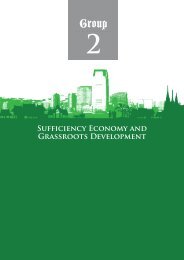Conflict, Legitimacy and Government Reform: Equitable Allocation of ...
Conflict, Legitimacy and Government Reform: Equitable Allocation of ...
Conflict, Legitimacy and Government Reform: Equitable Allocation of ...
Create successful ePaper yourself
Turn your PDF publications into a flip-book with our unique Google optimized e-Paper software.
<strong>Government</strong> <strong>and</strong> Political <strong>Legitimacy</strong><br />
parties. The position <strong>of</strong> prime minister was strengthened. The role <strong>and</strong><br />
power <strong>of</strong> the legislature was diminished. Various independent monitoring<br />
organizations were established; the Election Commission was to filter<br />
those allowed to enter politics <strong>and</strong> the National Anti-Corruption<br />
Commission was to guarantee <strong>and</strong> verify politicians’ transparency in<br />
exercising state power. State decentralization <strong>and</strong> people’s political<br />
participation in such matters as law-making, petitions for political<br />
impeachment, public referendums on important issues <strong>and</strong> before<br />
starting <strong>of</strong> new mega-projects affecting the environment <strong>and</strong> people’s<br />
lifestyles were promoted<br />
Despite the aim <strong>of</strong> the new constitution to strengthen Thail<strong>and</strong>’s<br />
democratic system, Thai society was unfortunate. A billionaire politician<br />
who was good at playing political games used money, populist policies,<br />
<strong>and</strong> marketing strategies to centralize <strong>and</strong> monopolize power. Within<br />
three or four years this led to the end <strong>of</strong> the political rule established by<br />
the 1997 constitutional framework, which hoped to make the Thai<br />
democracy strong, efficient in responding to the people’s needs <strong>and</strong> wellbalanced<br />
among different branches <strong>of</strong> power.<br />
At the moment, there is an attempt to solve the problem caused by<br />
the structure <strong>and</strong> process <strong>of</strong> the governing institution by changing the<br />
House <strong>of</strong> Representatives’ election system <strong>and</strong> the determination <strong>of</strong><br />
Senate membership. The attempt also includes providing severe<br />
punishment for politicians <strong>and</strong> political parties involved in vote-buying,<br />
<strong>and</strong> revising processes <strong>of</strong> selecting members <strong>of</strong> independent agencies.<br />
However, it seems that the more attempts made to solve the problem, the<br />
more controversial the issue becomes.<br />
Political demonstrations against the government have broken out<br />
very <strong>of</strong>ten since the adoption <strong>of</strong> 2007 constitution. The coup<br />
government led by General Surayuth Julanond faced protests <strong>of</strong> the<br />
National United Front <strong>of</strong> Democracy Against Dictatorship—UDD (the<br />
Red Shirts supporting Thaksin). After the People Power Party (the<br />
successor <strong>of</strong> the Thai Rak Thai Party dissolved by Justices <strong>of</strong> the<br />
Constitutional Court on 30 May 2007) won the general election on 23<br />
December 2007, it became the leading party <strong>of</strong> the two coalition<br />
119














